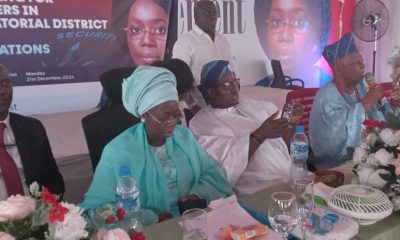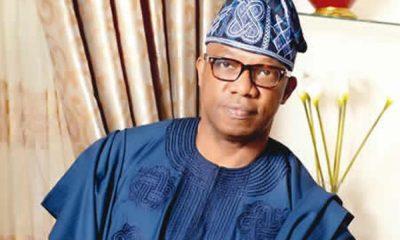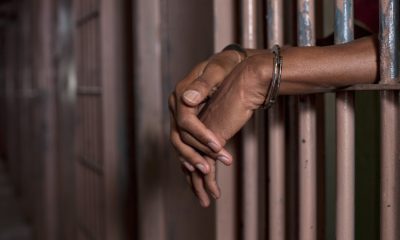Opinion
When couples are partners in crime
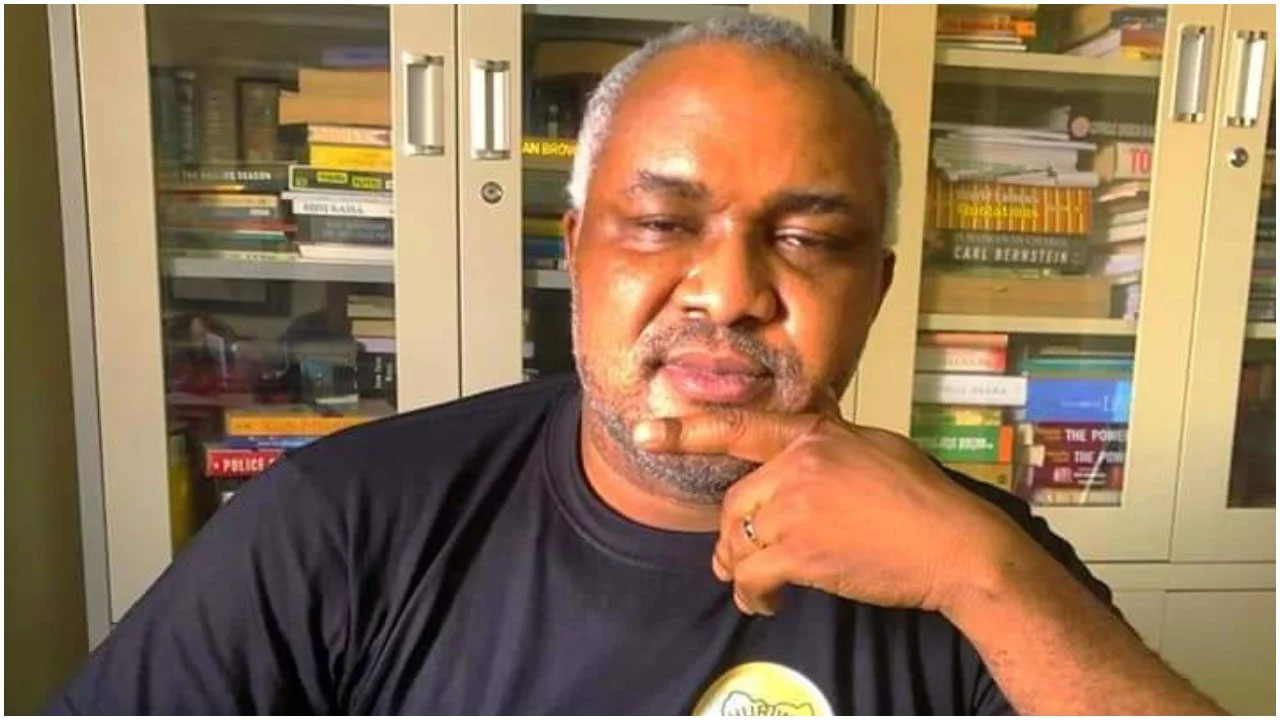
When couples are partners in crime
By Emmanuel Onwubiko
ON 4th of January 2024, yours faithfully woke up from the wrong side of my bed, feeling like I don’t want to go to work today even when as the head of the HUMAN
RIGHTS WRITERS ASSOCIATION OF NIGERIA (HURIWA), I had scheduled a major media conference which is the first in the new year 2024.
What came to my mind was a particular popular song by some European singers few years back who were actually singing that they don’t want to do anything on a particular day and that they will simply sleep, wake up, have their bath, eat and go back to sleep.
I really can’t figure out the identity of those musical team members but I can remember graphically that they were each mimicking in a video recording, series of decorated monkeys who were just lazying joyfully around the room.
The rhythm of that award winning song promoting relaxation dominated my thinking faculty except for one necessary distraction: my daily reading of news copies from Nigeria and globally.
That necessary distraction not withstanding, the nostalgia of the just ended Yuletide period which I spent in my hometown of Arondizuogu, was hanging all over me like a sweetened bunch of banana fruits falling on top of me from a very well cultivated farmland somewhere in Arondizuogu.
So, I decided to just relax some more hours on my bed before heading out to carry out my mandatory press briefing which we had long scheduled at our non-governmental organisation.
It was whilst I was in a relaxation mood, browsing through the Internet for local news about Nigeria that I ran into a particularly intriguing news copy from the Economic and Financial Crimes Commission (EFCC).
READ ALSO:
- Amotekun shot, whisked Ibadan Poly student away 370 days ago
- Traffic infraction: Govs lack power to nab military man – Soldier blasts Sanwo-Olu
- Three notorious ‘one chance’ armed robbers arrested in Lagos
Mind you, the EFCC has recently become the cynosure of all eyes from curious Nigerians who are simply imagining if this government anti-graft institution has become a new body that will say and mean what they say regarding the crusade against growing trend of corruption and economic crimes involving top government officials. If truth be told, the majority of Federal government ministries, agencies and parastatals, have become cesspool of corruption.
Recently, the EFCC tweeted a so-called interview granted by the erstwhile Petroleum minister Mrs. Deziani-Alluson Maduekwe which purports to state that she made confessional statements which a section of the British media carried in which the current governor of Zamfara was implicated in alleged money laundering. But the EFCC quickly deleted that post from their social media account. Predictably, nobody in Nigeria is concerned about such a mind-blowing revelation for whatever it is worth.
But this story isn’t just about the routine news copies about the EFCC parading some youngsters over suspected cases of been involved in advanced fees fraud. It is not about the fallacy made by the EFCC’s head in which he accused seven out of every higher institution’s students of doing ‘yahooyahoo’ or advanced fees fraud.
The story was of a deeper genre which have both the social and cultural dimensions which I think the scholars of social studies or sociology ought to go into broader research to ascertain the trigger for such a social trend.
The story is about the observation made by the EFCC that couples in Nigeria are increasingly getting entangled in criminal cases of frauds and advanced fees fraud.
Also, the EFCC did something particularly impressive: they proffered the fundamentals behind the unprecedented scale of couples in Nigeria getting involved in such crimes as aforementioned.
The head, Cybercrime of the Economic and Financial Crimes Commission (EFCC), Nura Buhari, attributed the increase in the number of couples committing crimes to greed and loss of traditional values.
“It’s just the 21st century generation where people believe they can make money through the internet by identifying a glitch or system weakness and committing fraud,” Buhari said in an interview with one of the nation’s fast growing online newspapers.
The EFCC official was reacting to the rising number of couples caught by the agency for their involvement in internet fraud.
READ ALSO:
- Police arrest ‘notorious cult leader’ in Rivers
- 2 police inspectors dismissed over alleged robbery
- Emefiele: EFCC operatives storm Dangote head office
On 28th November 2023, the Commission arraigned a couple, Oriyomi Idowu and Ruth Idowu, before Justice Mojisola Dada of the Special Offences Court sitting in Ikeja, Lagos over false pretence, money laundering, stealing, retention of stolen property and forgery to the tune of N2,757,188,000.00.
The couple were arraigned alongside Food Commodity Processing Enterprise, Bonway Food Processing Company Limited, Samee Idowu Company Limited and Farmex Integrated Companies Limited, which all belong to Ruth Idowu.
According to EFCC, sometime in 2023 in Lagos, Ruth converted the sum of N10,000,000 to purchase a GLK Benz, purchase sum derived from converting the sum of N500,000,000 belonging to Creditpro Business Support Services with the aim of disguising the illegal origin of the funds.
The accused also dishonestly retained the sum of N936,619,876 in UBA account, property of Creditpro Business Support services, knowing same to be funds fraudulently obtained from Creditpro Business Support Services but the defendants pleaded “not guilty” to the charges.
EFCC also arraigned another couple, Aisha Malkohi (a.k.a Ummitah, Arab Money) and her husband, Abubakar Sadiq Mahmoud (at large), over alleged fraud involving the sum of N410,518,000 meant for the purchase of cars from Saudi Arabia.
They were arraigned on 8th December 2023, before Justice Aisha Mahmud at Kano State High Court after they obtained the sum of N225,259,000 belonging to Farida Ibrahim between 6th January to 16th December, 2022.
The said money was reportedly paid into a Zenith Bank account bearing Abubakar Sadiq Mahmoud for the purchase and supply of 64 cars, from Saudi Arabia.
But Malkohi pleaded not guilty to all the five counts read to her.
Malkohi was arrested by EFCC investigators in Kano following a petition from two people–Farida Ibrahim and Ibrahim Mohammed Abdulrahman–alleging that she conspired with her husband and defrauded them under the guise of supplying them with cars, gold, electronics and kitchen utensils from Saudi Arabia.
EFCC carried out an investigation that revealed the defendant had collected a total sum of N410,518,000 through bank accounts belonging to her company–Golden Grass Hill International Ltd– and her husband’s Zenith Bank account.
Further investigation also revealed that the defendant, alongside her husband, who is still at large, diverted the monies into several bank accounts.
On 19th December 2023, the Enugu Zonal Command of the EFCC arraigned another couple, Mr. Udeani Sunday and his wife, Udeani Amaka, before Justice M.G. Umar of the Federal High Court sitting in Enugu.
READ ALSO:
- Lagos to partially close Third Mainland Bridge again from Tuesday Jan 09
- Zack Orji left National Hospital against medical advice – CMD
- Ex-minister appeals court judgement barring her from holding public office
They were arraigned on three-count charges bordering on obtaining the sum of N2,750,000.00 by false pretence in an alleged land fraud.
According to EFCC, between 10th July 2019 to 19th December 2019 in Enugu, the couple lured one Onugu Chinyere to deliver N2,750,000.00 to them under the pretence that they’d sell a plot of land behind Ebenezer Anglican Church, Ala-Uguaji along Enugu/Port Harcourt Road to her, but like the other couples they also pleaded not guilty and the case was adjourned till February 6, 2024.
Looking at these cases and the established harmonious pattern of couples increasingly becoming partners in the crime of fraud from a deeper philosophical point of view, is actually left for philosophers and free thinkers like us to weigh in. So why are couples who ought to behave as embodiment of good behaviour and the supposed teachers of morality and ethics to their children, now turning around to become undesirable social elements?
The EFCC has actually done us the philosophers the favour of pointing towards a very disquieting development in the underworld which should and must be further researched upon to reach a far-reaching understanding of the various underlying dimensions.
This is exactly what I set out in this essay to achieve and first, my initial point of call was a researched document done for the Pontifical commission by some scholars who I believe are Nigerians given the background of the information they shared concerning the genesis, essence and texture of what family means especially in the African milieu.
These Pontifical scholars saw the family as the smallest and oldest institution in society is important for the growth and development of society. It is the building block of society. The family takes a central role in the survival of the society as a whole, both for biological and social reproductions (Olutayo & Omobowale, 2006).
These scholars argued that in Nigeria, marriage is a pathway for the existence of the family. The family is considered a primary aspect of an individual’s life. There is a high value placed on marriage and the family, and most individuals will identify their families as the most important thing in their lives.
However, in their understanding, with modernization, industrialization, urbanization, and globalization, there is a shift in how marriage and family are now viewed. This is so true. Marriage in the 21st century is even beginning to take certain unpalatable shapes which is diametrically opposed to the entrenched traditional implications of marriage especially from the angle of what exactly constitutes marriage as it were.
Nevertheless, these scholars aforementioned stated that marriage and family have experienced fundamental changes, and this has major consequences to individuals and the society. Therefore, this presentation will focus on the changing patterns of African marriage and family in Nigeria and will discuss the historical analysis of marriage and family systems in the pre-colonial, colonial and post-colonial era; the delimiting factors affecting marriage and family systems; visible areas of changes in marriage and family; the future of marriage and family; the importance of family in the present generation; and practical ways to improve marriage and family systems.
On the definition of marriage and family (the philosophical, social, and economic viewpoint of marriage), the social scientists stated that marriage and family are crucial systems in society. They are always linked together. They have a historical background and are as old as man on earth. The present definition of marriage is different from what it was several years ago. Marriage was defined as the union of a man and a woman for reproduction reasons. However, the definition has changed globally. Today, marriage can be defined with different viewpoints, as an institution, a partnership, and as a responsibility. Generally, marriage can be defined as the legally recognized union between two persons that is based on a sexual relationship. The philosophical basis for this union is that man should not be alone, but rather have a union that is completely legal and long-lasting; a legal union that is socially and religiously acceptable for sex and procreation. Socially, marriage forms the base of a family that helps in the transmission of cultural values from one generation to another. Economically, marriage is regarded as a legal union between two people that creates room for mutual gainful interdependence.
Similarly, there are various meanings people give to what constitutes a family. The conservatives will define the family as a social group made up of the father, mother, children, and other extended family members. Sociologically, what constitutes a family is much more complex. A family is defined as a social group that is joined by either blood, marriage, and adoption that serves as the economic unit of the society. Because the family is the bedrock of a society, the state must protect families. The Nigerian marriage and family systems have undergone several changes in society and these changes keep defining whether marriage and family are really functional or necessary in modern society (https:/www.pass.va/en/events/2021/family_ecology/eghafona.html).
There are actually a formidable body of scholarly works on the renowned African cultural values, one of which states that in Africa, the sense of family unit, ethics and etiquette are fundamental to understanding who the African is at all times.
Interestingly, a reputable philosopher and theologian, Reverend father Oliver Onwubiko one of our professors during my years as a Philosophy student in Nekede Owerri under the Claretians Institute of Philosophy, has done a body of scholarship on African cultural values. He listed the following African cultural values: sense of community life; sense of good human relations; sense of sacredness of life; sense of hospitality; sense of the sacred and religion.
From the above, it is unambiguous to assert that the cause of the degeneration that we see happening within the family system in Nigeria, has to do with what Anthropologists identified as social change theory. When the media of mass communication including the social are now dominating their platforms with contents that are poorly produced with the central them of justifying the pursuit of money by all means as the contemporary culture universally.
We will look at a publication of the journal of anthropology that was done in 2012 to understand in broader perspective why couples are increasingly committing crimes which are antithetical to the respected African tradional and cultural values of a sense of respect for honesty and the good name of the family units.
The Anthropologists stated as follows: “Odetola [6] see “social change as primary change in social relation.” Succinctly put, social change means change in social structure, within the framework of such structural changes, in social institutions.”
READ ALSO:
- AFCON 2024: CAF increases winner’s prize money to $7m
- Man arrested for attacking Lagos building control officials with charms (picture)
- N40bn probe: EFCC may declare ex-minister wanted, traces N30bn to private accounts
“Basic institutions perform function for the society, thus these basic institutions are dynamic and adaptive to changes. It should be noted that the environment of social structure requires certain amount of persistence in some of their features in order to perform that expected function. But observations portray that society and indeed components of social structure change continuously though often imperceptibly. Social change could either bring about progress for the members of a society or visit them with retrogression. As human beings collectively adapt themselves to their environment, they bring about changes to their ways of life.”
“But for the purpose of the status quo, we are concerned about the changes that transform the fabric of our culture occasion our forgotten values day in day out. The applicability of this theory is that it has strongly affected the ways of doing things in all societies. The urbanization and industrialization have altered the totality of our social institutions, not living the political and economic systems unaffected. The Nuclearization of the family has also negatively touched the socialization and internalization processes.”
“In a nutshell, the factors responsible for social change have brought about major changes in the traditional-to-modern society. Since change is inevitable, cultural dynamics of any society cannot be foreclosed be it in form of cultural accumulation, that is, addition of new traits to the already existing ones or cultural reduction, or cultural diffusion which is infusion of new cultural traits. All this can still be in a way checkmated,” (www.hindawi.com).
The lesson is that families in Nigeria should and must return back to the days of yore and embrace a revisiting of the renowned African cultural value systems especially as it relates to the family, hard work, and the sense of honesty.
I remember vividly that my late father Mazi Osonduagwuike Okorieocha Onwubiko once asked me, as a 14 year old Senior Secondary school student, how I got the resources to buy a brand new set of shoes which at that time wasn’t even more than N10,000 but was actually the reigning fashion of that epoch.
But as far as my father was concerned, accountability and transparency were his hallmarks and he made it mandatory that his children will never be permitted to bring in materials or items of suspicious sources or origin.
Recently too, a story in the media was about a mother in Delta State who turned down an offer of a brand new Mercedes benz automobile bought by her undergraduate son in his late tens. The mother refused to accept the car gift because the son is just a student and has no validly traceable source of incomes.
It turned out that the boy was into ‘yahoo yahoo’ or advanced fees fraud.
The contemporary society as it were, has their work cut out and it is imperative that we once more accept and embrace those authentic African cultural values that promote honesty, hard work, and the sense of the sacred and religion.
If this done, couples wouldn’t want to stain their reputation by going into crime because as the popular saying in Africa says that “good name is better than dirty money” and this should be our national mantra rather than the current madness about chasing money and making money by all means.
***Emmanuel Onwubiko is the head of the HUMAN RIGHTS WRITERS ASSOCIATION OF NIGERIA (HURIWA) And was NATIONAL COMMISSIONER OF THE NATIONAL HUMAN RIGHTS COMMISSION OF NIGERIA.
Opinion
Nasir El-Rufai’s scorched-earth one-man opposition, By Farooq Kperogi

Nasir El-Rufai’s scorched-earth one-man opposition, By Farooq Kperogi
Like a stranded mariner gasping on the shores of irrelevance, former Kaduna State governor Nasir Ahmad El-Rufai writhes in the uneasy throes of power’s withdrawal. His disquiet, however, is less the quiet lament of a fallen statesman and more the tempestuous fury of a Shakespearean woman scorned.
He has become fiery, irascible, indignant, and unrelenting in his public expressions of rage towards his former friends in power who have isolated him. He is throwing the kitchen sink at the power structures in Kaduna and Abuja in an all-out effort to extract vengeance and to ward off potential ensnarement.
The former cushy, self-satisfied, and illiberal denizen of power who was the scourge of dissenters railing against tyranny, now finds himself wielding the very defiance he once crushed with arrogance and malevolent glee. He has become an accidental insurgent (a la “accidental public servant”) forged in the crucible of his own contradictions.
There is a part of me that loves this new insurrectionary, rebellious, activist, and intensely irate one-man band opposition that El-Rufai has opportunistically transmogrified into.
For one, he is providing the first real opposition to the Bola Ahmed Tinubu administration. Every democracy needs the well-aimed slings and well-informed counsel of a sharp-witted opposition to keep its leaders from sinking into the depths of self-satisfaction and insouciance.
Say what you will about El-Rufai, but his intellect, erudition, and rhetorical dexterity are top-notch and undeniable. Imagine if figures of his political stature, institutional access, and strategic acumen had chosen to be thorns in the current corridors of power. Perhaps, the Tinubu administration would have thought twice before treating Nigerians with the cavalier disregard that has become its trademark in the last two years.
For another, he has an opportunity to experience what his critics went through when he was a governor for eight years. He abducted critics, caused opponents to be tortured, bragged about reducing politicians he has displaced to mere “bloggers,” instrumentalized the courts to squelch dissent, etc.
Now, he posts social media updates about his former commissioners being “abducted,” about the judiciary being weaponized against his supporters and his past administration, about the “misuse of federal security agencies in the persecution of opposition leaders,” etc.
READ ALSO:
- Osimhen scores hat-trick as Galatasaray demolish Antalyaspor
- My wife is a pastor, can’t be Bigot, Tinubu tells Catholic bishops
- Electricity: TCN blocks access to data from DisCos
Not only has El-Rufai become a “blogger,” once his favorite pejorative for social-media-active politicians he has dislocated in Kaduna, he has now plunged deeper into a lowly “content creator.” With the launch of a TikTok account, he’s gone from being a mere “blogger” to a digital hustler, complete with the undignified ritual of soliciting Nigerians to subscribe to his channel.
Yet, I am delighted that El-Rufai has joined our ranks. Professional “wailing wailers” like me (to use former presidential spokesman Femi Adesina’s agonizingly asinine and illiterate insult for government critics) welcome him to the club.
Nonetheless, my joy that he is inadvertently rendering a democratic service by the constancy and stridency of his strictures against the government has not blunted the acuteness of my awareness that he is an unbearably devious, self-seeking, hateful scoundrel who is only on a mission to avenge what he perceives as a personal affront to him.
As most people have already observed, had El-Rufai secured the minister of power position he was promised, his current antagonism toward the government would be as unimaginable as a cat lobbying for the rights of rats.
Not only would he have been a staunch defender of every government action, but he would have also directed his trademark vitriol at ordinary Nigerians suffocating under economic hardship. He would dismiss their grievances with characteristic scorn and cruelty.
Indeed, the same northern establishment he now courts and seeks to mobilize as a political cudgel would have been his favorite punching bag—just as it was in 2023, when he enthusiastically championed Bola Tinubu’s candidacy.
It takes an unnatural degree of slow-wittedness not to see that El-Rufai’s newfound disillusionment with the governments in Kaduna and Abuja reeks less of principle and more of a bruised ego nursing its wounds.
READ ALSO:
- Customs seize 1,149 jerry cans of petrol in Taraba
- 10 ex-Buhari’s ministers to dump APC for SDP
- FG refutes US Congress claim of terrorists targeting Nigeria’s Christians
In my July 27, 2019, column titled, “How Political Power Damages the Brain—and How to Reverse it,” I called attention to (temporarily) politically displaced whores of power like El-Rufai who pretend to identify with ordinary people in their moments of political trauma.
“Also look at previously arrogant, narcissistic, power-drunk prigs who have been kicked out of the orbit of power for any number of reasons. You’ll discover that they are suddenly normal again.
“They share our pains, make pious noises, condemn abuse of power, and identify with popular causes. The legendary amnesia of Nigerians causes the past misdeeds of these previous monsters of power to be explained away, lessened, forgiven, and ultimately forgotten. But when they get back to power again, they become the same insensitive beasts of power that they once were.”
Get El-Rufai back into power now or in 2017, he would be the same villainous backstabber he has always been. He would be the same annihilator of the homes of poor people. He would be the same horrid tormentor of critics.
In a September 20, 2019, article, I described him as “straight-up Nigeria’s most bigoted and most dangerous public official alive.”
El-Rufai’s latest political metamorphosis is less a transformation than a temporary realignment born of personal grievance rather than ideological conviction. His brand-new zeal for opposition, while inadvertently serving the democratic process, is unmistakably fueled by wounded pride and thwarted ambition.
The same man who once ruled with an iron fist, silencing critics with impunity, now fashions himself as the voice of the oppressed, railing against the very structures of power he once upheld with ruthless enthusiasm. His current posture as an anti-establishment crusader is not the product of principle but of exclusion, making his activism less an act of courage than an elaborate act of self-preservation.
Yet, even as he momentarily aligns with the forces of resistance, history warns against mistaking his opportunistic dissent for genuine reform. Should fortune return him to the corridors of power, El-Rufai would waste no time reverting to the autocratic instincts that have long defined him. He would crush opposition, weaponize state institutions, and wield power with the same reckless abandon that now makes him a pariah.
Today’s dissenter is often tomorrow’s despot. To embrace him uncritically is to risk aiding yet another cycle of tyranny dressed in the fleeting garb of rebellion.
Nasir El-Rufai’s scorched-earth one-man opposition, By Farooq Kperogi
Farooq Kperogi is a renowned columnist and United States-based Professor of journalism.
Opinion
Natahsha’s apoti is not godswill for Apkabio

Natahsha’s apoti is not godswill for Apkabio
Tunde Odesola
(Published in The PUNCH, on Friday, March 14, 2025)
The darkness was so heavy you could touch it. ’Twas so thick it could stain. Sinister and choking, the darkness screened off the sky and its moonlight. Without thunderclap nor lightning daze, rain poured down on the night of long knives.
Suddenly, a violent wind arose amid the footfalls of fleeing bandits, who slung huge sacks of stuffed ballot boxes over their shoulders like Father Christmas slings his sack of gifts.
“Ole! Ole! Ole! Thief! Thief! Thief! The pursuing citizens shouted. The vote robbers neither stopped nor looked back en route to their chamber, deriving inspiration from the proverb of perseverance that says, “When the egúngún is in pursuit, the pursued is advised not to stop because as fleeing humans tire out, so is the pursuing egúngún tiring out.”
One after the other, the bandits jumped into their fortress through the doors, windows and ceiling, slamming the doors, windows and attic shut before the masses could close in. Ruthless and rapacious, the bandits caught their breath like lions do after an arduous kill. Wow! That was a close shave!
Once the robbers ran into their Abuja fortress, the pursuers stopped and backed off, knowing full well the fortress was guarded by gunmen and the Constitution.
The rain continued to pour down in torrents. No owls hooted, no crickets chirped, no dogs barked, only darkness loomed. The Official Manservant of the bandits is called Mr Clerk. He pressed a button on his table, and the whole chamber came alive in full red colour.
Now, everyone is seated in their respective seat; their faces shone with sweat, rain and blood stains, each beaming with smiles and a sense of accomplishment. Handshakes, backslaps and bear hugs with cackles of laughter shook the chamber.
Apkabio is the leader of the hunting pack. He banged his gavel for attention and said in his peculiar accent, “Distinguished ladies and yentlemen, I, hereby, grant Mr Clerk the permiyon to address and pray for us. Please, let’s pay attenyon because it is my intenyon for our victory celebrayon to progress till the morning hours. We deserve to party and enjoy ourselves, ladies and yentlemen.”
READ ALSO:
- Witness speaks on Super cop Abba Kyari’s N200m in 10 bank accounts
- EFCC arraigns couple for N197m fraud, impersonating Katsina first lady
- How Natasha can get her Senate suspension reversed – Akpabio
Clerk: Let us pray. We’re grateful that it pleases the Lord Almighty to give our returning members sweet victory in their respective elections. Though the election battle was snatch and bolt, rip and run, the Lord gives victory to whom He loves…(Speaks in tongues: El shsasba prokorotori matayakata!). Father Lord, we pray that you be the guide and guard of Your children as they embark on their four-year legislative duties to their fatherland in Jesus’ mighty name!
Chorus: Amen!!!
An imam, whose tasbih (rosary) was longer than the intestines of a cow, was also on hand to pray for the brood of vipers. His turban was bigger than a parachute.
Apkabio: (Continuing in his funny accent) Mbon mmi, my own election was war! I didn’t participate in my party’s primaries, but I grabbed the ticket after I stuffed Supreme judges’ wigs, gowns and mouths with dollars. Okuk atan iko – money speaking. Money na water.
Fellow bandits hail Apkabio: After God na you!
Apkabio: No! No! No oooo! Make una no put me for wahala o. Yagaban na my oka (oga) o. I no near Yagaban a-roll a-roll (at all, at all) o.
Bandits: Hahahahahahahha. Na you, biko!
Apkabio: Where’s Honourable Natahsha? I can see a few honourables didn’t jump in through the doors and windows. Mr Clerk, please, tell Honourable Natahsha to see me in my private residence asap; there’s an urgent national assignment for her in my bedroom.
Clerk: Sir, Honourable Natahsha dropped a petition about the arrangement of the chamber.
Apkabio: Tell her I’ll do anything she wants, whenever and wherever she’s ready to tickle my fancy. She can have anything in this chamber, including my humble self. Who am I but a mere servant, ready to sow and reap in lush vineyards? Uwem enem – life’s sweet o.
The gang bursts out laughing.
Clerk: I’ll let her know, Your Honour, sir.
The gang partied late into the night, blasting Olu Maintain’s hit, Yahoozee; Kelly Hansome’s Maga Don Pay, and Living Things by 9ice, among other crematorium songs.
(Inside Apkabio house, domestic staff engage in gossip)
Gardener: (Singing African China song) …Mr President, lead us well; If you bi governor, govern us well; If you bi senator, senate am well; If you bi police, police well well, no dey take bribe…
Maid: Akpan, if oga or madam hear di song you dey sing, just know say your work for dis house don finish. Both of dem dey para now o.
Cook: Ekaette, wetin you mean? Why dem dey para nah?
Maid: Udoh and Akpan! Una no hear wetin dey happen!? Di yellow canary wey oga tink say im catch with im bowler hat for inside chamber, by the time oga put im hand inside the hat, oga no grab canary o, na shit oga grab! And the bird don dey sing to fellow Nigerians since!
READ ALSO:
- Dangote gives 10kg rice each to one million Nigerians
- Putin gives conditions for Ukraine ceasefire
- New Zealand university offers up to $10,000 scholarship for international students
Gardener: Ha, Ekaette, na wa o. E bi like say dem take women swear for oga. Which kain insult oga never see on top woman matter? Dem don tear oga singlet, beat am, spit on am.. Haba! Shey na di route wey oga follow come dis world im wan follow go ni?
Driver: No bi today nah. You sabi how many earrings and nails wey I don pack while cleaning oga limousines? I no go tell una other extracurricular items wey I don sweep comot from inside oga limousines. Shey una see dat oga head wey bi like Abiku head, na only women and how to thief money full am.
Cook: You mean say oga dey do on motion?
Driver: Oga na ‘Everywhere You Go Turaya’, e dey active on land, air and sea. But dis Apoti wey oga go siddon on top don burn oga yansh, oga no fit siddon again. Apoti na wetin Yoruba dey call small wooden seat. Igbo people dey call am ‘obere oche’. Hausa dey call am ‘keremin kujira’. Dis apoti hot pass furnace.
(Vehicle horns blare. People talk outside the gates, raining curses on Natahsha and singing the praise of Apkabio)
Maid: Protesters don come collect money – human rights activists, police, students, labour, journalists, traders, lawyers, town unions, etc. Oga don spend real money on top dis skirt and blouse matter o.
Cook: Hey, look! See oga’s chief of staff don dey come downstairs; make e no meet us here o. O ya, o ya, make everybody disappear. Me, I never obtain Yankee visa, I dey waka go boys’ quarters o.
(Domestic staff disperse quickly)
The next day, Apkabio locked himself inside his room. He was greatly disturbed because the Yellow Canary wouldn’t stop singing. In fact, she has taken her song beyond the compromised courts in the land, to an international tribunal, where she’s singing on the top of her voice. Sweat broke on Apkabio brow.
He looked at himself in the mirror and shook his head. He opened his mouth, but no word came out. He cleared his throat and tried again to talk, yet there was no word. He slumped on his bed and wept.
Apkabio drifted into a dream. In the dream, Apoti pummels and drags him to the edge of a cliff and pushes him off, he shouts and jerks awake, panting, sweating and cursing.
Outside the room, Mrs Apkabio hears her husband’s shout. She rushes in. “Ha, my lord, why are you shouting and sweating like this?” she asked. “It’s that witch o, that ashewo girl. She pushed me from a cliff, but Mama Bourdillon grabbed me before I nack head for wall,” he replied.
“Blood of Jesus! This will pass, my husband. I’ve mobilised serving and retired female and male crooks, and they’ve been singing your praise. I recruited Itu Iya Ita in Calabar and a former Lagos Minister who has fallen on bad times. I also recruited a member of a family reputed for betraying,” she said. “Thank you,” Apkabio replied.
Mrs Apkabio: But you sef, why you no dey take eye see anything in skirt?
Apkabio: Na my enemies use women curse me, I swear.
Mrs Apkabio: See your mouth, he-goat! Abeg, I’m going downstairs to pay some leaders of Niger Delta militants who have been helping us threaten to cause wahala if you’re removed.
Apkabio: Thank you. I’ll never chase anything in a skirt again.
Mrs Apkabio: What if she no wear skirt?
(Both burst out laughing as the wife exits)
All alone, Apkabio goes back to the mirror and looks at himself; a one-horn, one-eyed principality stares back at him. Then, his inner mind spoke: “Apkabio, you’re a disgrace! You stole your way into the House. But instead of repenting from your old ways, you refused. What legacy do you intend to bequeath? A professor who rigged an election for you was jailed. You head a House of criminals, some of whose members are wanted for international crimes in the US and Europe. A current member of the hound is still in prison abroad. Apkabio, look at your life!
Email: tundeodes2003@yahoo.com
Facebook: @Tunde Odesola
X: @Tunde_Odesola
Natahsha’s apoti is not godswill for Apkabio
Opinion
Farooq Kperogi: New insights into “Badamasi,” “Gbadamosi,” and IBB’s paternal heritage

Farooq Kperogi: New insights into “Badamasi,” “Gbadamosi,” and IBB’s paternal heritage
Former President Ibrahim Badamasi Babangida’s autobiography triggered questions about the onomastic etymology of “Badamasi,” his former last name, which appears to share historical and semantic kinship with the Yoruba “Gbadamosi.” It also activated interest in his paternal heritage about which he has been strategically coy, which I captured in my last column.
Because I know that the best system of inquiry for facts is necessarily question-oriented, self-critical, and cumulative, I shared a perspective I had heard about the provenance of Badamasi but expressed doubts about its reliability and historical accuracy and invited further reflections from others.
Saturday Tribune editor Lasisi Olagunju took up the challenge and, relying on insights from the late Sheikh Adam Abdullah El-Ilory, proposed that Badamasi originated from Ghadames (sometimes spelled Ghadamis), a historic Berber town in what is now Libya.
The town’s citizens are called Ghadamisi. It’s in line with the Middle Eastern practice of adding “i” to the end of the names of villages, towns, cities, and countries to form demonyms. Bukhari (which we domesticated as Buhari in Nigeria), for instance, means a native of the town of Bukhara, now in Uzbekistan, a West Asian nation that used to be a part of the Union of Soviet Socialist Republics (USSR).
Olagunju also referenced a fawningly Anglophilic, pro-colonial autobiography written in Arabic by a certain Abd Allah el-Ghadamisi, who arrived in Kano in 1903, titled, “Your Humble Servant: The Memoirs of Abd Allah Al-Ghadamisi.” He wondered whether this might be the book IBB mentioned as his grandfather’s favorite and that inspired him to name his son after its author.
He then suggested that the Yoruba Gbadamosi is more faithful to what he thinks is the original form of the name than the Hausa Badamasi since the voiced labial-velar plosive “gb” found in many Niger Congo languages, including Yoruba, is closer to the voiced uvular fricative “gh” in Arabic.
READ ALSO:
- EFCC grills ex-Minister Uju Ohanenye over N138m fraud
- Simon Ekpa, 16 others named as terrorism financiers, account frozen
- Militants orders non-indigenes to leave Rivers, threaten oil production
Well, Olagunju’s proposition appears to suffer a factual collapse when it is burdened with the weight of historical, chronological, and even sociolinguistic evidence.
First, anyone who reads Professor Razaq ʿDeremi Abubakre’s 2017 book chapter titled “Stefan Reichmuth’s Wanderings in Arabicized and Islamized Yorubaland” will come across an Ilorin Muslim scholar and poet by the name of Badamasi “from Ile Saura, Agbaji, Balogun Ajikobi Ward, who was one of the first people to produce Yoruba poetry in Arabic script (p.373).” He died around 1891.
This suggests that even Yoruba Muslims have borne the name Badamasi since at least the 1800s, years before Abd Allah el-Ghadamisi appeared in Kano.
Second, it is unlikely that Abd Allah el-Ghadamisi’s autobiography is the book IBB’s grandfather was fond of and that students of Arabic in Hausaland read for pedagogical and spiritual nourishment because the commentary on the book by Muhammad S. Umar and John O. Hunwick, which Olagunju references, describes the book as betraying “imperfect knowledge of written Arabic” and full of “simple errors of Arabic grammar.”
Such a book can’t be a model that Islamic scholars venerate and teach. In any case, it wasn’t a piece of Islamic scholarship. The memoirs, Umar and Hunwick point out, “construct a discourse that portrays colonialism positively through a particularly laudatory proclamation of the good deeds of colonial authorities….”
Third, Olagunju’s claim that “Because, sometimes an author gets more famous than his work, al-Ghadamisi’s name appears to have overwhelmed the book’s title” doesn’t seem to be true. Only one copy of Abd Allah el-Ghadamisi’s book has survived, according to Umar and Hunwick.
Fourth, although traders and Islamic scholars from Ghadames have lived in Hausa land since at least the 16th century, sociolinguistic evidence suggests that it is implausible for Hausa speakers to domesticate the Arabic phoneme “gh” to “b.”
When Hausa speakers borrow Arabic words with the phoneme “gh,” which doesn’t occur naturally in Hausa, they adapt it to “g” (and occasionally to “k”) but never “b.” So, it’s socio-linguistically improbable that Ghadamisi would ever become Badamasi to Hausa speakers. It would most likely be Gadamisi.
READ ALSO:
- Supreme Court orders Fubara to pay 27 pro-Wike lawmakers legal fees
- EPL: Amorim’s wife unhappy in Manchester United
- Scientists working to extend human lifespan to 250 years — Expert
Now, what might be the root of Badamasi? Someone on Facebook by the name of M.Y. Kabara (I wonder if he is a progeny of the famous Nasiru Kabara family in Kano who died in my final year at Bayero University) pointed me to Arabic sources that seem to definitively show that the name Badamasi owes its presence in (northern) Nigerian Muslim onomastic universe to an Egyptian poet by the name of Muhammad bin Ahmed bin Ismail bin Ahmed Al-Sharaf Al-Badmasi Al-Masri. (Miṣr is the Arabic name for Egypt).
He was born in 1808 AH (equivalent to around 1405) in the small village of Badamas and died in Mecca at the age of 40. He was famous for a book of Arabic poetry he wrote in praise of Prophet Muhammad (SAW) titled “al-Qasīdatul Mukhmasah,” which is very popular with Sufi Muslims and Arabic students in (northern) Nigeria.
I am certain that it’s the book IBB’s grandfather loved so much that he named his son after it—like many people in the North did and still do.
Kabara pointed out to me that because “every quintet in Arabic poetry can be called ‘mukhmasah,’” the book of poetry has come to be known by the name of its author to differentiate it from similar works.
According to Dr. Ihab El-Sherbini, author of the book “Stories of Mansoura’s Streets,” Badamas, the poet’s hometown, used to be called “Potamos,” which means “river,” but that Copts (descendants of ancient Egyptians who are now mostly Christians that are associated with the Coptic Church) called it Badamos. After the Arab conquest of Egypt in the 7th century, Badamos evolved to Badamas.
Over time, the Badamas village ceased to be territorially independent. It’s now a neighborhood of the Egyptian city of Mansoura.
Based on this new knowledge, I am prepared to suggest that Gbadamosi and Badamasi are mere onomatological false friends, that is, they are names that sound alike but that are actually different and descended from different sources.
I suspect that the Yoruba Gbadamosi traces descent from Ghadamisi, most probably from Abdallāh b. Abī Bakr al-Ghadāmisī, a 17th-century Arabic poet and Islamic scholar born in Timbuktu who wrote the famous Manāhij al-Sālikīn fī Manāfiʿ al-Qurʾān al-Karīm (“Paths of the Seekers to the Benefits of the Noble Qur’an”) that is popular with West African Sufis.
READ ALSO:
- Lawyers fault Senate’s suspension of Natasha Akpoti-Uduaghan
- Simon Ekpa accounts frozen for alleged terrorism financing
- Bandits kill 12 Zamfara community guards, vigilantes
Curiously, the resolution of the etymology of IBB’s middle name coextends with new hints I’ve encountered about the probable ethnic identity of his paternal ancestry.
The village of Kumurya in Kano where IBB told a biographer his paternal roots are located was founded by the Agalawa, a historical trading community in Hausaland, originally of Tuareg (Berber) stock who migrated into the Kano region in the 18th century.
Though now fully assimilated as a sub-group of the Hausa people, the Agalawa trace their ancestry to nomadic Tuareg origins in the southern Sahara. I owe this insight to Rabiu Isah Hassan who first pointed it out to me on Facebook and provoked me to read further.
In his 2005 book titled “Ecology and Ethnography of Muslim Trade in West Africa,” Paul E. Lovejoy points out that early Agalawa immigrants in Hausaland occupied a lowly social status because “Most had been enslaved from Sudanese populations (p. 16).” They were derisively called “Bugaje” (is the famous Dr. Usman Bugaje of Agalawa origins?) as a collective plural and “Buzu” as a singular form.
Over time, they acculturated, dominated commerce, became prominent in Islamic scholarship, and have now become indistinguishable from the native Hausa population, except that they tend to have a lighter complexion than Hausa people, which causes many people to mistake them for Fulani.
Is IBB aware of this history of his paternal ancestry but chose to conceal it for fear of exoticizing and alienating himself, especially in the eyes of southerners who tend to delegitimize people’s Nigerian origins when they find out that the ancestral origins of (mostly northerners) people can be traced to spaces outside what is now Nigeria?
No northerner would question the legitimacy of anyone’s “Nigerianness” because of the accident of the location of their distant ancestral roots. It’s a consequence of the originary syncretism of modern northern identity. We are all mixed with all sorts of stemma from a vast array of places because we were never an insular, landlocked people.
Many of Kano’s prominent merchant dynasties, for example, have Agalawa roots, a famous example being the family of Alhaji Alhassan Dantata, who was West Africa’s richest man in the early 20th century. Since Aliko Dangote’s mother is from the Dantata family, it means he is at least half Agalawa. He himself might even be ancestrally Agalawa.
What’s there to conceal about this, especially because our heritage—ethnicity, linguistic group, even religious traditions—is merely incidental to us. We didn’t choose it, so there is no basis to be proud or ashamed of it.
Farooq Kperogi is a renowned Nigerian columnist and United States-based Professor of journalism.
Farooq Kperogi: New insights into “Badamasi,” “Gbadamosi,” and IBB’s paternal heritage
-
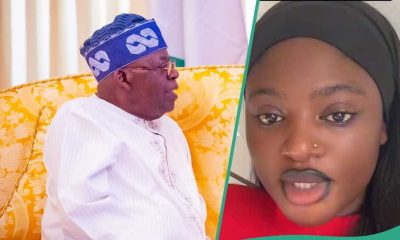
 metro3 days ago
metro3 days agoCorper who criticised Tinubu govt under pressure to apologise, says Sowore
-
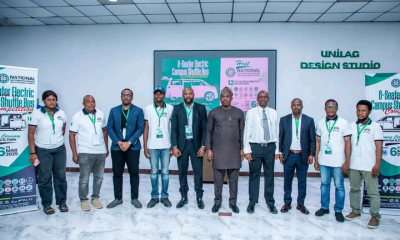
 Auto2 days ago
Auto2 days agoLanre Shittu Motors offers support for EV bus design competition in universities
-

 International23 hours ago
International23 hours agoUK announces new passport application fees starting April 2025
-

 metro3 days ago
metro3 days agoBreaking: Trans-Niger Pipeline in Rivers explodes in fire after militants threat
-

 metro3 days ago
metro3 days agoHusband bound, gagged by wife, children in Ogun community rescued (video)
-
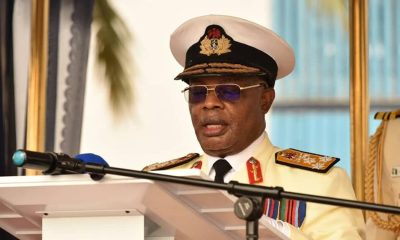
 metro2 days ago
metro2 days agoIbas: 18 things to know about Rivers administrator
-

 News3 days ago
News3 days agoBreaking: Tinubu declares state of emergency in Rivers State
-

 metro2 days ago
metro2 days agoSoldiers take over Rivers Government House after state of emergency declaration

